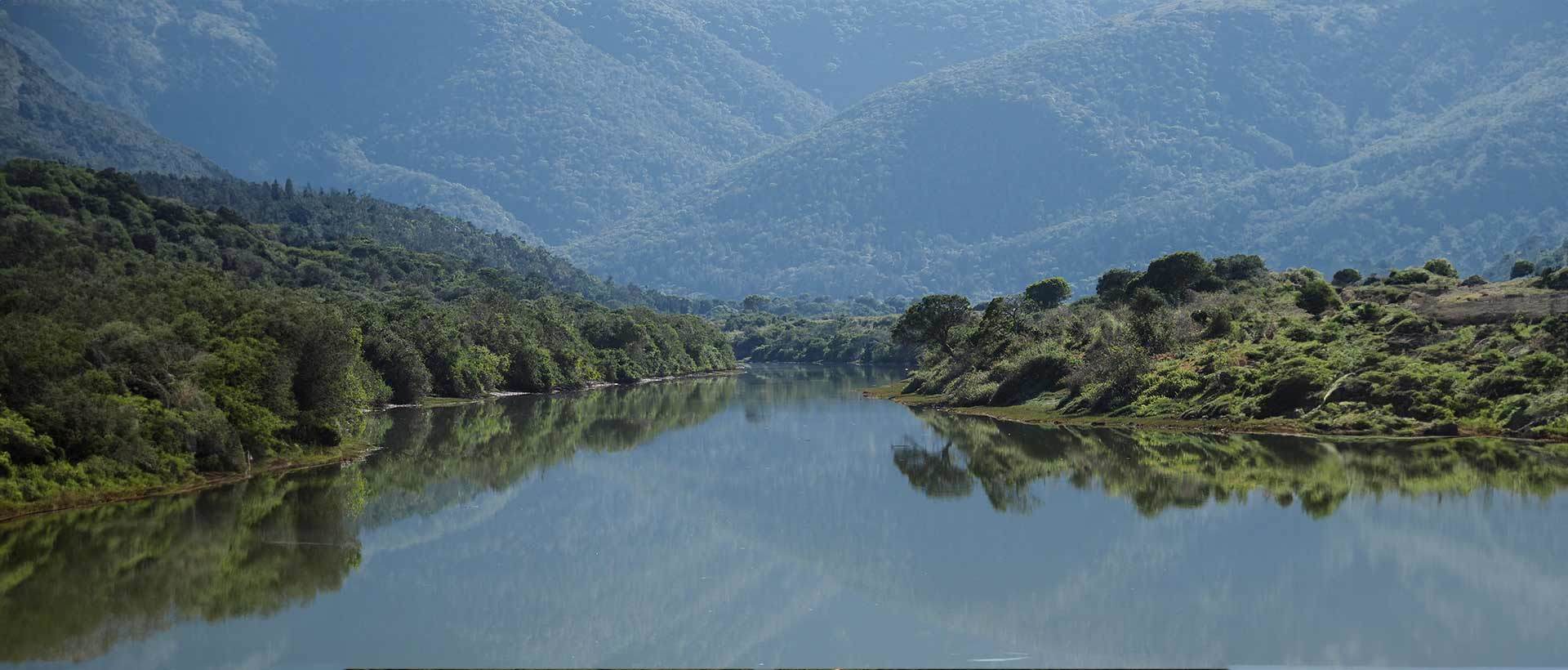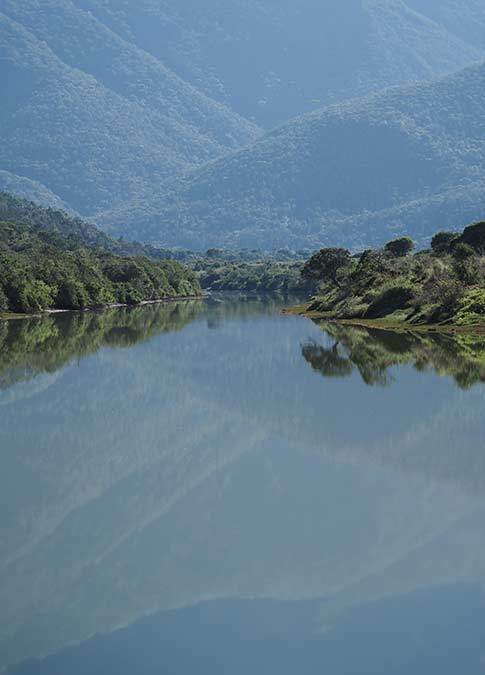Rhino Thandi
As I write, a beautiful full moon, the brightest phase of 2012 illuminates both the good and evil in the African landscape outside. How often in this world do a small minority of evil men, a fraction of all those that stand for good, dispossess the rest of us of beautiful moments such as these. The man in the moon, designed to mesmerise us with a peaceful sense of innocence as that big round smiley face looks down on us from above. I have always associated his expression with a sense of quite contentedness as his full face turns to look in on what we are up to on a monthly basis before going slowly back to his other business and leaving us to wonder up at the heavens on those spectacular dark, clear, African nights.
But that is all different now and on nights like these I can’t help but consider the thousands of rhino guardians on duty out there all over our darkened landscapes. Field rangers, anti-poaching patrols, police and army personal as well as so many others who have volunteered their presence to stand watch over what has sadly become known as the “poachers moon”. Most have to be armed now and at the risk of having to sacrifice their own safety, they spend many long, lonely and often cold nights out there in tensioned silence, starring at shadows that play games with the mind and straining to interpret the multitude of sounds that drift, amplified, across these usually tranquil scenes. Last week the tragic news of a friendly fire incident which killed two, a Kruger Park ranger and a policeman, has added even more senselessness to this crisis, and emphasises the strain we are all under.
The same moon that shines on those unsung heroes, who help protect our precious rhino, shines on Thandi and her companions tonight. During the day they have been under the watchful eye of Jason who gives us daily reports on her visual progress. Her group of rhino have yet to return to their normal day time routine so whatever she feels and remembers is still obviously very much a part of her altered condition. This has made observations of her face very difficult for the monitoring team and of concern to me as I can’t be sure that her progress is maintaining its previous course. I have had many queries about the decision to keep both her and Themba in the wild following the poaching. Treatments and observations would have been so much easier in a captive situation and in the event of something unforeseen going suddenly wrong, our response time will be delayed under her current circumstances. So the question needs to be answered.
I believe that every survivor situation will have a different set of circumstances governing decisions and not all reserves, its animals and the circumstances in that area will be conducive to a non-captive strategy. For me, the overriding consideration was the minimisation of stress. Given what these poor animals endured physically and mentally, their own familiar surroundings would, I thought, give them the best possible chance to heal from and incredible amount of physical and mental trauma they had been subjected to. The social animal dynamics were acceptable, food and water resources ample and the habitat relatively accessible.
That said, I am still not satisfied that we are able to gather enough information on a daily basis to remove cause for concern. Their reluctance to break cover during daylight is uncharacteristic, but understandable. I have once again called on the help of the Chipembere Rhino Foundation to improve on the technology aspect of our monitoring so they have sourced and funded a satellite tracking devise which we will fit during her next procedure. This will enable us to make more educated assumptions of her progress during these times when she is not showing her face to us during the day time.
Following the last procedure, IDEXX have processed the blood samples and Prof Reyers has made an in depth analysis of her most recent status on day 54. His conclusions are that, from a blood analysis perspective, he finds her progress to be very encouraging. Most tests undertaken are within the normal range and all the encouraging visual progress we found while hands-on, appear to be confirmed in her blood tests.
However, just as her behaviour is not yet completely normal, she still has some abnormally elevated indicators (such as Acute Phase Proteins) which remind us that inflammatory processes still persist within her body and hence she is still vulnerable to complications. The observations of Jason and the monitoring team remain vital to her treatment plan. Hopefully by deploying more technology, we can detect changes in routine and trigger quicker responses should they be necessary.
The vulnerability of her species increases daily, so the importance of Thandi increases too. Today we receive news of 211 poached so far in 2012, yes 211 rhino dead in just over 4 months of 2012. The projection of a possible 600 deaths by the end of the year is simply too depressing to consider and our short term goal has to be that we simply CANNOT allow this to happen. It is simply not good enough to be witness to these increasing statistics without increasing our efforts even more, no matter how much we are currently doing or not doing. Current circumstances can appear hopeless and by some accounts threaten to demoralise those that are putting so much into this fight. But the good news is that in spite of what people may say, in spite of the black market forces driving this cruelty, I have witnessed so many positives over recent weeks that I simply cannot be deflated by the figures.
At the beginning of this campaign following the slaughter of March the 1st, we put out a call to turn sympathy into action, and multitudes have been moved to respond. To hear firsthand accounts of what Thandi and Themba have stirred up in so many people is such a privilege. A few days ago I took the time to count the number of rhino related initiatives I have been asked to contribute to and I stopped counting at twenty-five. Of these only four existed before the story of Themba and Thandi catapulted us forward into action. It is surely an indication of the potential for a change in attitude that these few rhino have made capable. They have given us ample motivation to throw ourselves at our part of the front line, and in the process they have given us new ammunition to pass around to so many others who fight for the cause. If this is what two months can do around one poaching incident, I can testify that there are enough people in this world who care deeply for our rhino and who have had enough of watching from the sidelines. From where I stand, I see them putting up their hands and asking what they can do. I see people getting out of their comfy seats and turning words into deeds. What I see is uplifting, motivating assuring and inspiring, and what makes it exciting is that it’s infectious and its spreading fast now.
The fruits of these initiatives will take months to show themselves but I am so grateful to be able to report that we have made some significant media inroads around the world one of them being the continued profiling of the plight of the rhino by NBC News in the USA. Our appreciation and thanks must go to Harry Smith, Meghan Frank and their team whose lives have been touched by this story in a direct way. They spent time with and filmed Themba, Thandi and the other bull in October 2011 a few months before they were poached. The web update I mentioned during my previous report had such a response that they aired a follow up on the 25th of April making this the third programme they have produced in two and a half months. What’s more is they are asking the right questions of their politicians as well as their countries military capacity to assist us with critical technology that has the capability to make a big difference.
When I speak of making the bullets that can keep you effective in the battle we are fighting, this a wonderful example, a powerful tool, so easy to forward onto so many in your network to keep people informed. Please use it and the others which I will ask Des at Tweeters to post over the coming week.
I have also had the privilege of addressing more diverse groups of people from school kids to Rotarians and it is amazing to see what imaginative ways they are finding in order to be able to do something positive. This is such energy being generated now all around our magnificent country and its spreading across the world.
From the market countries, we have received some very promising reports from China of a crack-down on illegal trade in animal products involving 100 000 policemen. The reports which I have seen from two different media sources claim they raided almost 6 000 markets and seized over 130 000 wild animals. We simply have to find more ways of influencing governments at market level to stop the demand for rhino horn. I am waiting on independent confirmation of these figures from Chinese NGO’s.
When I consider the levels of awareness fifteen months ago and recall the level of caring and degree of proactively back then, it is remarkable what a collective effort has achieved across our country. Tonight (Tuesday 8th May @ 21h00 on Animal Planet DSTV Channel 264 & repeating at 20h00 on Wednesday) we dedicate episode three of “:Safari Vet School” to our magnificent rhino, who, despite all we have achieved, still continue to go through unthinkable suffering. The story of Geza is still having an impact on people across many countries 15 months later, through programmes such as these. How much more, will Themba and Thandi do for their species in the months and years ahead?
I believe, as it has been suggested, that the story of these two rhino, in the hands of the right collection of people, has the ability to facilitate a paradigm shift in the minds of those with the power to stop the poaching.
Today the story is in your hands to be shared with the world. As Thandi fights like the champion that she is, we look for human champions to come along side of her, to package their story in ways that have never been told before, to make a difference that until now, has never been seen before. Sixty-eight days, have achieved so much. Now is NOT the time to slow down.
Will Fowlds









